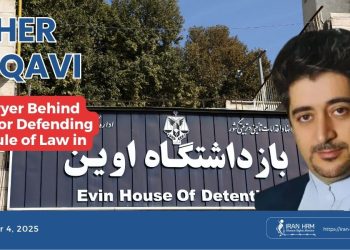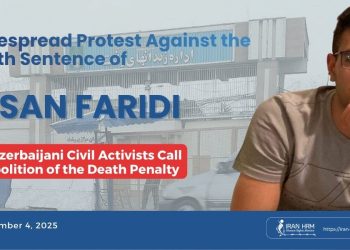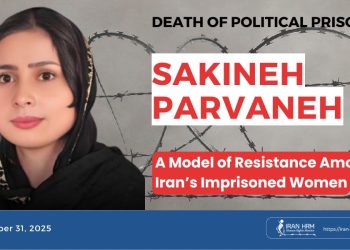Fashafouyeh Prison, located in southern Tehran, is no longer merely a detention center for criminals; it has become an invisible arm of political repression. Following the bombing of Evin Prison, the ruling regime in Iran secretly transferred hundreds of political prisoners; including many with serious illnesses; to Fashafouyeh, without notifying their families.
This prison lacks hygiene, medical care, classification, and basic human supervision.
The transfer was no accident. Fashafouyeh was deliberately chosen; not out of chaos, but to implement a silent and systematic policy: to erode the bodies and spirits of resistant prisoners in silence.
The regime’s repression is no longer limited to executions and torture. It has embraced a more insidious method of elimination: death by medical neglect.
Yet in the midst of this rotting structure of repression, voices still rise; voices of the sick, with broken bodies but unbroken spirits, declaring:
We exist, we see, we resist.
A Story Called “Endurance,” But Its Meaning Is Resistance
Mohammad Akbari Monfared, age 58, suffers from congenital leg paralysis, heart disease, hypertension, and neurological problems. He is held in a general ward without access to a wheelchair or even a cane. After one of his crutches disappeared, he lost the ability to walk unaided and now relies on the help of other prisoners to reach the toilet.
And yet, like his sister Maryam Akbari Monfared, he continues to raise his voice. He files complaints, bears witness, and refuses to appear as a victim — instead, he insists on being seen as a man who still stands.
Numbers That Scream
In Ward 4, Type 2 of Fashafouyeh Prison, at least 23 chronically ill prisoners have been identified, each suffering from multiple serious conditions:
- Mir Yousef Younesi (72): diabetes, intestinal colitis
- Reza Ehtehami (70): severe arthritis, blocked coronary arteries
- Majidreza Maki Niri (64): diabetes, deprived of cardiac checkups
- Sirous Fathi: bone marrow disorder and low platelet count
- Mohammad Ali Gerami and Amirarsalan Shabani: severe epilepsy
- Mohammad Ali Mahmoudi: leukemia, type 1 diabetes, heart failure, and neurological disorders
- Motaleb Ahmadian, a Kurdish political prisoner, suffers from duodenal cancer, diaphragmatic hernia, spinal stenosis, and urinary infections. Despite medical approval, he was denied essential medications four times by prison authorities.
And the list goes on: hernias, migraines, blood disorders, arthritis, spinal disc herniation, prostate issues, depression, gout, hemorrhoids…
What sets this list apart is not the sheer number of illnesses, but the quality of their resistance.
They have not remained silent. They have written letters, filed official complaints, obtained medical certifications, gone on hunger strike, and sent their voices outside the prison walls.
The Clinic That Operates Like a Black Market
Fashafouyeh has a designated medical center, but treatment is only granted to those who pay or have security clearance.
Medication is either unavailable, overpriced, or subject to haggling.
Transfer to a hospital? A fantasy. Sometimes, even with a doctor’s approval, an Intelligence Ministry officer blocks it. Other times, there’s no vehicle. In some cases, delays are so long that the prisoner passes out — or dies — before ever reaching a hospital.
Still, these sick prisoners fight — not only for their own lives, but for the rights of others.
As one of them said:
“Here, a blood pressure pill is worth more than all the regime’s promises of justice.”
Yet they do not stay silent, even for that one pill.
Hunger Strikes, Letters, and Defiant Silence
- Motaleb Ahmadian went on hunger strike in May 2025 after being repeatedly denied his prescribed medications.
- Farhad Salmanpour Zahir, despite having medical approval for spinal injuries, was denied care.
- Siamak Amini, suffering from blood disease and unable to sit upright, writes daily notes to his cellmates.
These acts may seem small but in a system designed to erase voices, every whisper is a blow against the imposed silence.
From December 2024 until now, Mehdi Vafa’i Sani has been denied any medical transfer by direct security orders.
Yet in a letter to his cellmates, he wrote:
“This is my pain, but don’t leave me alone. Be our voice.”
Those words have become a shared charter of solidarity among Fashafouyeh’s sick.
Nasrollah Fallahi (68), suffering from hand tremors, joint pain, low blood pressure, sinus infections, and H. pylori, drags himself from bed just to write down the medication lists of other inmates and submit them to prison staff.
No one asked him. But he stands; for others.
From Evin to Fashafouyeh: Escalating Torture by Transfer
Many ill prisoners were transferred from Evin to Fashafouyeh after airstrikes by night, without belongings, equipment, or even proper clothing.
With spinal fractures, cancer, paralysis, and countless other afflictions, some did not even have a mattress. Sleeping on the concrete is no longer an exception it’s the norm.
In tin ‘roofed halls that burn like ovens in summer and freeze like tombs in winter, every sleepless night becomes a new form of torture.
In these conditions, not only are diseases left untreated, but prisoners’ bodies rapidly deteriorate due to malnutrition, lack of clean water, oxygen deficiency, and denial of medication.
Human rights reports confirm that death by neglect is not the exception in this prison it is the expectation.
White Torture: A Modern Architecture of Elimination
Abandoning a sick prisoner without medication, oxygen, rest, or access to doctors is nothing less than white torture.
Under international and domestic law:
- Article 5 of the Universal Declaration of Human Rights
- Article 10 of the International Covenant on Civil and Political Rights
- Mandela Rules (Rule 22)
- Iran’s own Prison Regulations (Article 118)
Every prisoner is entitled to the same standard of healthcare available to citizens outside the prison.
What happens in Fashafouyeh is a clear violation of all these provisions.
If We Don’t Listen Today…
Fashafouyeh is not just a prison.
It is a mirror, a reflection of what the bodies and minds of political dissidents endure under the mullahs’ regime.
Silence about these prisoners only pushes them closer to death.
But responding to them interrupts the cycle of erasure.
Many have not only fallen ill, they have disappeared.
No names, no photos, not even a medical record.
This report is a candle in that darkness for those who resist through pain.
There is pain in Fashafouyeh,
but no surrender.
There is illness,
but no silence.
Death is lurking,
but life is still resisting.







